Seized narcotic drugs, precursor chemicals and
poppy seeds destroyed in Lashio, Shan State (Norrth)
Poppy seeds destroyed
could have grown on about 100,000 acres with expected yield of 43 tons of opium
Yangon,,
27 Oct – The second ceremony to destroy narcotic drugs, precursor chemicals and
poppy seeds seized in Shan State (North), organized by the Central Committee for
Drug Abuse Control, was held at the sports ground in Lashio, Shan State (North),
at 4 pm on 25 October, attended by Chairman of the Work Committee for
Development of Border Areas and National Races Secretary-1 of the State Peace
and Development Council General Khin Nyunt.
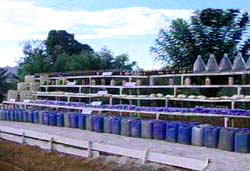
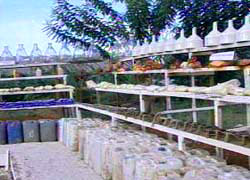
Members of Lashio Township USDA Daw
Than Than Htay and Daw Shwe Aye acted as masters of ceremonies. First, Commander
Brig-Gen Myint Hlaing made a speech. In his speech, he said the first ceremony
to destroy seized narcotic drugs and poppy seeds was held at the Lashio Sports
Ground on 7 June 2002 and the present was the second time. It is known to all
that Myannar had been under the colonial rule and due to divide-and-rule policy,
the internal insurgency occurred after regaining the independence and due to the
evil legacy of the colonialists, cultivation of poppy has existed.

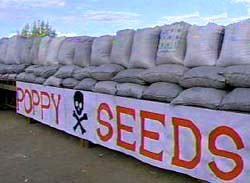
The Government in cooperation with the
entire national people has been making relentless and sustained efforts in
preventing the scourge of narcotic drugs, the evil legacy but some countries
which could not bear to see the national development and peace and tranquility
are turning a blind eye to the authentic facts and have been manufacturing
fabrications concerning narcotic drugs with the use of media to tarnish the
image of Tatmadaw and the people in the eyes of international community. The
entire national people, hand in hand with the Government, have been making
resolute efforts in narcotic drug eradication. Due to relentless efforts of the
national races and measures taken by the national race leaders out of goodwill
for prevention of narcotic drug and reducing of poppy production, the farmers
have handed over their poppy seeds and poppy bulbs, thus contributing to
destruction of poppy seeds.
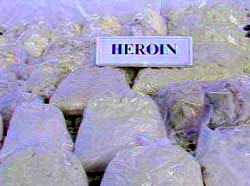
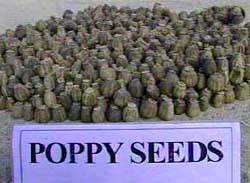
The Government is making efforts with
added momentum for eradication of narcotic drug as well as cultivation of
poppy-substitute crops, and considerable assistance was provided to the farmers
who earned their living by growing poppy in the past. As a result, K 42.5
million has been spent on cultivation of poppy-substitute crops.
In accord with the guidance of the Head
of State and under the supervision of the command and Shan State Peace and
Development Council, efforts are being made with the help of the ministry
concerned for distributing poppy-substitute crops to farmers and land
reclamation has been carried out for cultivation of pigeon peas, tea, coffee,
thus further contributing to boosting their income and enhancing their living
standard. Similarly, in livestock breeding sector, efforts are being made for
breeding of pigs, poultry and keeping bees up to commercial scale after setting
up large farms and technology has been disseminated and quality strains
distributed to national organizations and local farmers.
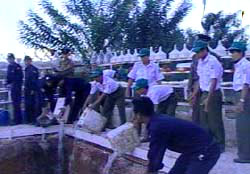
The narcotic drugs, poppy seeds,
precursor chemicals and paraphernalia to be destroyed today are 2712.5 Pyi of
poppy seeds, 35256 Pyi of dry opium bulbs, 4487 kilos of heroin, 383.18 kilos of
raw opium, 3 kilos of morphine powder. 16.33 kilos of opium residue, two kilos
of stimulant tablets, 8.7 kilos of stimulant tablet powder, 115 kilos of
ephedrine, 3, 530.76 litres of chemical liquid, 7,089 items used in shredding
poppy, 65 items used in consuming opium and other paraphernalia. The commander
expressed his firm belief that measures could have to be taken in turing the
Shan State (North) into the drug free region based on combined efforts of the
State, the entire national people and the national race leaders enlisting the
strength of the Tatmadaw in response to the goodwill of the Head of State.
Minister Col Thein Nyunt delivered an
address. He said I believe that the occasion today is significant and will
remain as a milestone in the history of Myanmar’s efforts to combat narcotic
drugs. The unscrupulous elements have made attempts to have a long existence of
the internal insurgency and poppy cultivation, the two evil legacies of the
colonialists. In addition, they have been encouraging external encroachments,
that contributed to production of narcotic drugs. After the Tatmadaw Government
took over the State power in 1988, the policy of national unity was laid down
stressing priority in national solidarity, development of the border areas and
the national races.
As a result of realizing the
Government’s objectives with sincere intentions, 17 armed groups have returned
to the legal fold. This unprecedented success laid open for the first time in
the post-independence period, opportunities and success to all round development
programmes in the entire country and fulfillment of the basic needs of the
inhabitants of the border regions. Since peace and stability was established,
access to far-flung and remote places made possible to carry out prevention and
suppression of opium production. As a result of the changing situation, it can
be said that narcotic drugs will be eliminated gradually, if the regions will
develop.
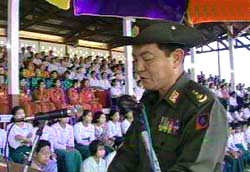
In accordance with the changing
situation, the Head of State laid down the two strategies for narcotic drugs
elimination in Myanmar, – to designate narcotic drug eradication and prevention
as a national responsibility and to carry out this responsibility with added
momentum; and – to gradually eliminate poppy cultivation by raising the standard
of living of the national races in the border areas. The drug problems of
Myanmar are not only dependent on and inter-related with stability, peace,
development and solidarity among the national races but also combined with the
regional development, education, health and social development, and development
of the life of the inhabitants of the regions.
As the eradication of drugs has been
carried out focusing on the development of fundamental needs and infrastructure
development, the local inhabitants and ethnic groups realizing the sincere
intentions of the Government have fully cooperated with the programmes. Mongla
Special Region-4 in the Eastern Shan State, emerged as an opium free zone in
April, 1997 and this stands testimony to this successful cooperation.
Acknowledging the Government’s sincere efforts, the leaders of the national race
groups have joined hands with the government in constructing roads, bridges,
canals, dams, hydro-power stations and communications stations as the
fundamental items to develop the border region and the national races as well as
development of opium-substitute crops cultivation, livestock breeding,
education, health sectors and educative courses with a view to strengthening
solidarity and unity among the ethnic brethren.
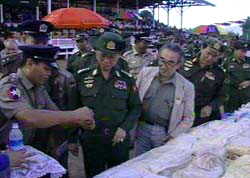
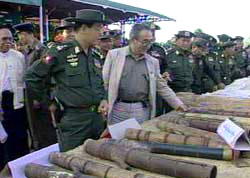
While educating the farmers to grow
opium- substitute crops instead of poppy, substitute crops seeds that are
appropriate to the areas and climate are distributed for cultivation on the
other hand. On realizing the sincere intention of the Government, the opium
farmers, on their own accord, have come up voluntarily to hand over poppy seeds
and bulbs that have kept for the next season. To date, 61,323 pyis of poppy
seeds and dried 78,505 pyis of poppy bulbs in Shan State (North), 8,908 pyis of
poppy seeds in Shan State (South), 864.699 pyis of poppy seeds and nine pyis of
dried poppy bulbs in Shan State (East), 23.44 pyis of poppy seeds in Kayah
State, 2,013 pyis of poppy seeds in Mandalay Division, 53.875 pyis of poppy
seeds in Kachin State, totalling 78,736.764 pyis of poppy seeds and 19,749.75
pyis of dried poppy bulbs have been voluntarily presented to the authorities. A
total of 98,486.514 pyis of poppy seeds that would be changed from dried poppy
bulbs were surrendered. In this way, such quantity of seeds that would be grown
in over 98,486.514 acres of land and production of opium 43.34 tons have been
prevented.
The local populace has been active not
only in crop substitution and alternative development activities but also in law
enforcement activities like collecting information, investigation and
destruction. In Laukkai region, they have formed drug suppression teams on their
own and from 1st to 15th of April 2002, a total of 52 paraphernalia was
discovered and seized from the valleys and mountains. In addition, 41 kilos of
heroin was seized in Wa region during the period between July and September
2002. It is the indication that the local residents had been fully cooperating
with the Government. With regard to drugs control, Myanmar has been cooperating
very closely with neighbouring countries as well as countries in the sub-regions
and region.
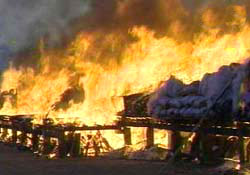
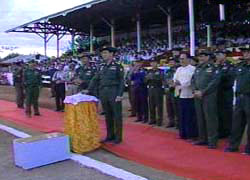
As per bilateral cooperation, Myanmar
and China under the cross-border cooperation project, liaison offices have been
opened Lweje on the 31st October 2000 and in Chin Shwe Haw on the 11th March
2001 respectively. For improvement of Myanmar-China Narcotic Drugs Elimination
Cooperation, NNCC of the People’s Republic of China donated 11 tons of potato
seeds, 600 kilos of Chinese-pea and 400 kilos of green pea for opium-substitute
cultivation programme in Shan State Special Region-1, Kokang Region in Laukkai,
on 15 October 2002 under the arrangements of Public Security Minister Jia
Chunwang of the People’s Republic of China and Chairman of CCDAC Minister for
Home Affairs Col Tin Hlaing.
In addition, within 2001-2002, Myanmar
handed over drug traffickers wanted in China for nine times. Documents were
handed over once. In this regard, 13 drug culprits and two drug traffickers
seized were handed over to China by Wa on their own arrangements. Such events
have clearly proved that Myanmar is very serious and deeply taking part in
combating drugs. International media has picked up such incidents. The above
presentation in the efforts and success of drug control covers only some of the
activities on drugs elimination and the standing of our country.
In conclusion, I would like to express
here that this second Destruction Ceremony to destroy the poppy seeds, seized
drugs, chemicals and paraphernalia seized in Lashio and Laukkai regions, Shan
State (North), clearly indicates the result of the commitment and full
cooperation of the local inhabitants. If the local inhabitants take part in and
show enthusiasm in this sort of cooperation, I am fully confident the drug
scourge threatening the whole mankind will not find a place on the soil of
Myanmar.
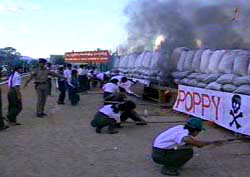
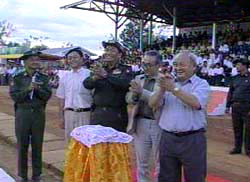
Then, the Secretary-1 and party, guests
and national race leaders viewed the drugs, poppy seeds and precursor chemicals
to be destroyed in the sports ground.
Afterwards, the Secretary-1, Lt-Gen
Aung Htwe, the commander, the minister, national race leaders, who returned to
the legal fold, Mr Tomomitsu Iwakura and Professor Akio Ujihara took positions
at the designated places and pressed the buttons to set fire to the drugs.
Those present also took part in
destruction drugs. Then, the Secretary-1 and party and guests viewed the drugs
being ablaze. The Secretary-1 and party and guests observed the documentary
photos on activities of narcotic drug elimination in Shan State (North) and the
ceremony came to an end.
The drugs destroyed at the ceremony
were 2,712.5 pyis of poppy seeds, 35,256 pyis of dried poppy bulbs (18,822.77
kilos), 44.87 kilos of heroin, 383.18 kilos of raw opium, three kilos of
morphine, two kilos of stimulant tablets, 8.70 kilos of stimulant power, 115
kilos of Ephedrine, 16.33 kilos of opium residue, 120 kilos of acetic anhydride,
883.85 litres of ethyl ether, 727.36 litres of ethyl, four litres of
hydrochloric acid, 90.80 litres of phenyl, 1,704 litres of sulphuric acid, 60
kilos of sodium carbonate and 13 kinds of related materials. Altogether 18,823
kilos of poppy seeds destroyed today can be put 11,526 acres of land under poppy
cultivation and if refined, five tons of heroin with the face value of US$ 1,070
million can be obtained.